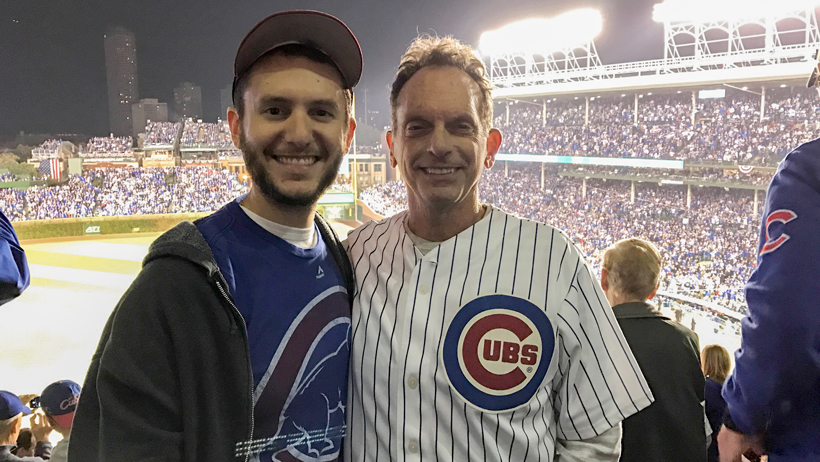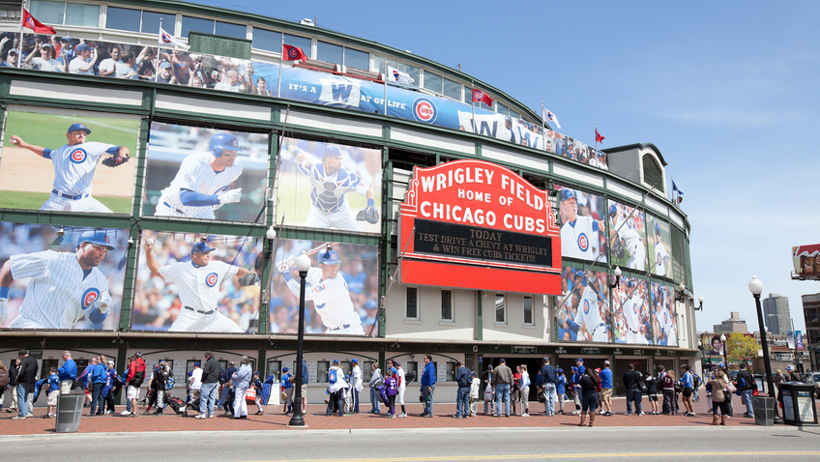In 2003, I was coming of age as a Chicago Cubs fan and starting to hone the keen wit that made me the go-to headline writer for my high school newspaper. As the Cubs entered the playoffs with an eye on breaking curses and making history, I imagined Cubs outfielder Moises Alou driving in the game-winning run that would send the Cubs to the World Series for the first time in 58 years so that the next day's Tribune headline would read: "Moises leads Cubs to promised land."
Well, needless to say Moises didn't lead the 2003 Cubs anywhere except into an even deeper melancholy and hysteria about curses as he watched Steve Bartman snag that foul ball away from him (allegedly) with the Cubs five outs away from a World Series. Now, Alou is mostly remembered for peeing on his hands.
Anyway, when that "what if" headline came to me, so did the realization that the narrative of the Cubs and the narrative of the Jewish people are not all that different from one another. Wandering through the desert for 40 years and waiting over 100 years for a championship? I'm not sure which is worse.
As my Cub fandom has deepened throughout my life, so too has my Judaism, and it has become clear that my identity as a Jew and my identity as a Cubs fan have a lot in common.
This is probably true for most Jewish baseball fans of any team; baseball is the most religious of all sports. There are rites, rituals and customs. Football devotees -- they are the Pagan worshippers of the sports world with their costumes, face paint, tailgating and glorification of violence; in baseball, there are stadiums deemed "cathedrals." And whether it's the legendary story of Sandy Koufax not pitching in the World Series on Yom Kippur or just the sheer number of baseball professionals who are members of the (not Cleveland Indians) Tribe, baseball has always been the most Jewish.
As for Cubs fans, we might be missing kosher food choices at Wrigley Field, but just about everything else -- from the team history to the fan mentality -- is as Jewish as you can get. It's why Jews make good Cubs fans, and Cubs fans make better Jews.
For tonight's Game 7, there's sure to be a lot of praying, but regardless of whether those prayers are answered and the Cubs' story changes, little will change Cubs fans and "The Cub Way."
We pass our fandom on from generation to generation
Practicing Judaism is easily the longest standing tradition in my family, dating back presumably to Mt. Sinai. The next longest? Rooting for the Cubs.
Most young Cubs fans can trace their family fan history back at least a couple generations. We talk about our fandom as being inherited -- passed down to us from our parents and grandparents -- l'dor vador . And like embracing our Judaism as a bar or bat mitzvah and eventually as a grown adult, we must ultimately choose being a Cubs fan for ourselves. This is not so easy to do when even the grandparents who gave us this tradition have never seen a Cubs World Series championship. We ultimately trust those who came before us and adopt this way of life.

Me and my dad at NLCS Game 6 against the Dodgers.
Passing down the tradition of Judaism also informs us how to pass down the tradition of being a fan, so it should come as no surprise why so many who identify as practicing Jews would identify as being huge sports fans. We understand what it means to be dedicated and loyal and that by our example we transmit these values to our others.
We know a lot about waiting, having faith and believing
Being a Cubs fan doesn't get more Jewish than this. With no championships in the last 108 years, rooting for the Cubs is the ultimate exercise in human spirituality.
I will admit that as I was nervously waiting in my apartment to leave and attend Game 6 of the National League Championship Series, which could end up being greatest Cubs game I ever see in person, I channeled my emotion into creating music (this is normal for me). What came out was a niggun, a wordless Jewish spiritual melody, filled with longing and desperation, and it wasn't long before I realized that this melody needed to be set to the words of "Ani Ma'amin," which, of course, is a song about waiting and believing completely in the coming of the Messiah.
Although working toward making the world a better place so as to bring everlasting peace will always be ongoing and "winning it all" in baseball is actually achievable, the takeaways of striving and hoping for both are surprisingly similar.
Standing behind the Cubs has taught us the importance of taking each season and each game one at a time, as hard as it is. It has taught us how to celebrate the good times, and how to mourn a sudden loss and move on with hope for the future. It has taught us how to be both realistic and optimistic. And if nothing else, it has taught us how to be patient. These are all valuable lessons in living full lives.
We are simultaneously the most pessimistic and optimistic people ever
You won't find a fan base anywhere in baseball that contains both the most blindly optimistic fans you've ever seen and also the most insufferably pessimistic. For every diehard fan that has said "This is the year!" this season, there's one who has completely written the Cubs off at one point during every playoff series. And the one type of fan is wont to completely agitate the other.
I'll admit to leaning more toward the pessimism side. Firstly, I blame my father, but secondly, it's been easier that way. The Cubs have disappointed their fans for more than a century, and each generation of fans has seen it happen, sometimes in the most optimistic of circumstances.
Jewish history has given us (and especially those who came before us) more than our share of difficult moments and reasons to be pessimistic. They need not even be mentioned. Yet we are still here, and we are still hopeful for the future (while also believing Judaism is dying at the same time).
We have a thing for blue and white flags
Ok, so maybe this one is a little overly simplistic, but Cubs fans and Jews alike are really into flying blue and white flags proudly. More significantly, flags have become the preferred symbol of pride for Cubs fans and the Jewish people, though we'll give the edge to Jews since the "W" flag has only recently become a rallying symbol for the Cubs. Regardless, we wave our flags proudly and see it as a more dignified way of showing pride. No mascot/idol worship for us.
There are people who hate us just to hate us
I experienced a handful of trash-talking Chicago White Sox fans growing up, but not until I attended school in Missouri did I realize the extent of hate toward the Chicago Cubs. My first two years of college in 2005 and 2006 (a White Sox championship followed by a Cardinals championship) were downright miserable, and were of course followed the next two years by great Cubs teams that went 0-6 in the playoffs.
What I couldn't understand then and can't understand today, is how anyone could legitimately hate a team that has done nothing but lose for 100 years. They've literally gotten in no team's way. You don't have to cheer for the Cubs, you don't have to pity the Cubs even, but hate? Until last year's playoffs, there was no Cubs-Cardinals rivalry, just the Cardinals beating the Cubs decade after decade or at least winning more when it mattered.
I think the hate pretty clearly stems from the size of Cub nation and the number of Cubs fans that live throughout the world who have remained fans even though our team has been terrible. They don't understand us. Hate toward religious groups often comes from that same place -- not having empathy and maybe even being a little jealous of our attitude in spite of our long history of misfortune.
We have a holy space and we want to be there
If we're going to compare being a Cubs fan to being Jewish, then Chicago is Israel, the North Side is Jerusalem, Wrigleyville is the Old City and Wrigley Field herself is the Western Wall. That might seem extreme, but there's an undeniable emphasis on holy space for both Jews and Cubs fans.
The analogy of Wrigley to the holiest site in Judaism became all the more apparent to me when the Cubs advanced to the World Series. My friends out among the diaspora of Cubs fans were all suddenly trying to make arrangements to come to Chicago for the weekend home games. Even if they didn't have tickets, they just wanted to be there . If all Jews believed the Messiah was coming, we'd all be trying to get to Jerusalem. We'd all want to be there.
The exorbitant wait times and prices at the bars around Wrigley tells you just how important "being there" is for Cubs fans. Everyone wants to be a close as they can, even when the game is not being played at home.
We are more superstitious and neurotic than most
Baseball is a sport for the superstitious. So many things can go wrong. Unfortunately for the Cubs, they have. Naturally, it's made Cubs fans among professional sports' most superstitious groups.
The "Curse of the Billy Goat" says it all. Even though the Boston Red Sox scientifically proved the validity of curses by breaking the "Curse of the Bambino," Cubs fans won't stop talking about the goat in the room until it's gone; it's always easier to blame the scapegoat.
Cubs fans are more likely than most to believe that something they do influences the game, from items of clothing and going to the same spots to even not watching the game if the Cubs did well when they weren't watching. And some of us take it very seriously.
The Jewish people are historically superstitious, though this has definitely been toned down over the centuries. But many of the customs and practices we observe today have roots in superstition. As such, we're used to doing a lot of strange things in hope of achieving desired outcomes. More practically, we find the satisfaction and understand the value in doing them, as nonsensical as they might be.


.jpg?n=7370)

.jpg)


.jpg)



